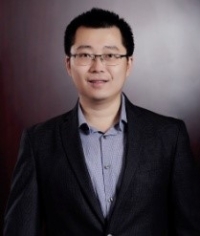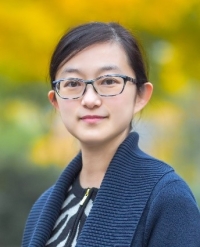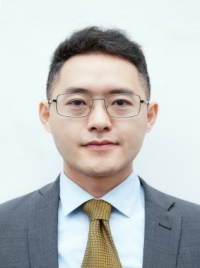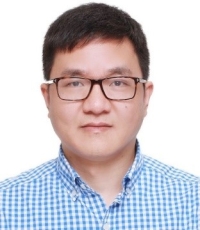
(9) Complex Networks: Tao Jia, Southwest University, China (Chair)
9.1. Speaker: Prof. Tao Jia, Southwest University, China

Talk Title: The upper bound of link prediction by the AUC measure
Abstract: Link prediction aims to predict missing links that are not directly visible but likely to exist. While this can be formulated as a binary classification problem solvable by machine learning algorithm, a class of ``similarity based'' methods are also widely considered. The similarity based approach considers the existing topology of the network and takes a certain topological feature to assign a similarity score between two nodes, which is proportional to the probability that they should be connected. The area under the receiver operating characteristic curve (AUC) is widely considered as the golden standard to quantify the quality of prediction, which can be interpreted as the chance that a true missing link has a higher score than the nonexistent one. Here we theoretically and empirically demonstrate that the performance of a family of link predictors, if measured by AUC, has an upper bound for a given network, which is determined by the topological feature selected for similarity calculation, and is rooted in the way that AUC is quantified. The upper bound predicts the performance of other predictors in the same family, allowing us to better choose features/predictors. It also gives rise to an issue of evaluation saturation, when the AUC gives a very tight upper and lower bound on the performance measure, which needs to be carefully treated. Given the popularity that the similarity based link prediction is applied in network science, our finding brings new insights on a series of important questions that were not emphasized previously.
Biography: Prof. Tao Jia obtained his Master in industrial and system engineering and Ph.D. in physics at Virginia Tech. He worked as the postdoctoral researcher at Northeastern University from 2011 to 2013 and at Rensselaer Polytechnic Institute from 2013 to 2015. In September 2015, he worked as the professor at Southwest University (China) and is now the Associate Dean of College of Computer and Information Science of Southwest University. Dr. Jia's research interest focuses on the computational and analytical understanding of complex systems, including complex networks, social systems, and biological systems. As the first author (and co-corresponding author), he has published on journals such as Nature Human Behaviour, Nature Communications and Physical Review Letters. He is awarded the Chinese Government Award for Outstanding Self-Financed Students Abroad in 2011.
9.2. Speaker: Prof. Linyuan Lv, University of Electronic Science and Technology of China(UESTC), China

Talk Title: Characterizing cycle structure in complex networks
Abstract: Compared with star structure, cycle structure is an important cause of the complexity of network structure, a necessary basis of feedback effect in network and an important condition of dynamic evolution. Today the star structure has been widely studied in network analysis, while the cycle structure has received rare attention. Here we propose the perspective on network research, namely the cycle structure, and show difference and relationship between star- and cycle structure in understanding network structure and dynamics. We define a new node characteristic, cycle ratio, which can be used to measure a node’s importance of structure and dynamics. Numerical analyses suggest that the nodes with higher cycle ratio are more important to network connectivity and network pinning controllability. We hope that this paper canopen a new direction of understanding both local and global structures of network and its dynamics.
Biography: Prof. Linyuan Lv, full professor of Institute of Fundamental and Frontier Sciences at University of Electronic Science and Technology of China (UESTC), board member of Network Science Society. Main research interests include complex networks and information filtering, an interdisciplinary domain related to both statistical physics and information sciences. Published more than 70 research papers in peer-reviewed international journals and conferences, of which the majority are published in prestigious journals, like Physics Reports, PNAS, Nature Communications, etc. Nine papers are the ESI Top-1% highly cited papers. All publications get more than 3500 citations from the Web of Science, and more than 8000 citations from Google Scholar, H-index 32. Academic monograph link prediction won the first prize of excellent academic book award of the 4th China university press. Applied for twelve patents, five of which were licensed. In 2018, awarded MIT Technology Review Innovator Under 35 China (MIT TR 35). The member of China Society for Industrial and Applied Mathematics (CSIAM) Activity Group on Complex Network and System Control, the member of Chinese Information Processing Society of China Activity Group on Social Media Processing, the board member of Network Science and Engineering Committee, associate editor of International Journal of Modern Physics C.
9.3. Speaker: Prof. Xin Lv, National University of Defense Technology (NUDT), China

Talk Title: Network evolution of a large online MSM dating community: 2005 - 2018
Abstract: Due to multiple sexual partners and low condom use rate in MSM (men who have sex with men), the probability of HIV infection in MSM is much higher than that of the general population. In addition, MSM is likely to become the medium of HIV, prompting the virus to transmit to the general population. Therefore, it is of great significance to analyze the characteristics of online activities of MSM and to understand the evolution of their social networks, which is essential for establishing and improving the health management mechanism on the MSM population. In this study, we collect a comprehensive dataset, covering the period of January 2005 to June 2018, from the largest Chinese online community, Baidu Tieba. We build the online dating network for MSM-related people in the community of gay-bar, and analyze the network from both static and dynamic aspects. We find that the degree of the node shows an significant positive correlation with the sum of the weights of all edges it is connected to and that there is a geographic homophily in this online MSM dating network, indicating the same geographical location is an important factor on MSM's social relationship. We analyze the dynamic features of the MSM online dating network with time evolution, including the dynamics of the shortest-path length, clustering, assortativity, community, etc. It is found that most network measurements tend to be stable at the later stages of the evolution. In comparison with heterosexual networks, we find that the MSM dating network shows differences from many aspects.
Biography: Prof. Xin Lv is the professor at the National University of Defense Technology (NUDT) in China. He is the co-founder and board member of the international non-government organization Flowminder Foundation (www.flowminder.org), which is focusing on the analysis of big data and providing them for free to organizations and relief agencies. Using large-scale mobile phone data, Dr. Lu and his colleges have collaborated closely with UN organizations and industry associations such as UNFPA, OCHA, UNU and GSMA etc., to analyze human mobility pattern and change of behaviors during disasters to enable improvement of disaster response and emergency management. Their work in the past years has stimulated a revolutionary movement in the research of mobile phone data and was published in Nature (Correspondence), Nature Microbiology, Physics Reports, PLOS Medicine, PNAS, Global Environmental Change, Journal of the Royal Statistical Society, Social Networks, etc. His research received a lot of media attention and was reported in BBC, New York Times, NPR, etc. They were nominated for Global Mobile Awards 2012 and were listed The 10 Breakthrough Technologies 2013 by MIT Technology Review. Flowminder has won the Mobile in Emergency or Humanitarian Situations Global Mobile Award (GLOMO 2016) at the Mobile World Congress 2016 for their groundbreaking advances made in the aftermath of the Nepal earthquake.
9.4. Speaker: Prof. Gang Yan, Tongji University, China

Talk Title: Controllability and predictability of real temporal networks
Abstract: Links in most real networks often change over time. Such temporality of links encodes the ordering and causality of interactions between nodes and has profound effect on network dynamics and functions. Recent evidences recognize that link temporality of real networks is not completely random, yet it has been challenging to measure the regularity of temporal networks due to the entanglement of topological and temporal link patterns. Here we propose an entropy-rate based framework for quantifying the predictability of any temporal network. We validate our framework in various model networks, demonstrating that it indeed captures the intrinsic topological-temporal regularity while previous methods characterize only one aspect or only the regularity in link weight distributions. We apply the framework to a wide range of real networks and unveil the predictability profiles for different network categories. Interestingly, we find that a temporal network can be highly predictable even when both its topological and temporal regularities are very weak. Moreover, a recent discovery demonstrated that temporal networks are more controllable than their static counterparts in terms of control time, control energy and control path length. However, the underlying mechanism continues to elude us. Here we analytically and numerically investigate the controllability of temporal networks, finding that the (even tiny) change of link weights, not the order of snapshots, makes temporal networks more controllable. These findings deepen the understanding of temporality in complex systems.
Biography: Prof. Gang Yan is a full professor with School of Physics Science and Engineering at Tongji University, an adjunct professor with Shanghai Institute of Intelligence Science and Technology, and also with Center for Excellence in Brain Science and Intelligence Technology, Chinese Academy of Sciences. His research focuses on network science and its applications to brains, and has published 32 papers in international journals, including Nature, Nature Physics, Physical Review Letters, etc. He is a recipient of the Thousand Youth Talents Plan (2016), and an associate editor of IEEE Transactions on Network Science and Engineering.
9.5. Speaker: Prof. Zhen Wang, Northwestern Polytechnical University (NPU), China

Talk Title: Data Science and Collective Intelligence
Abstract: One of the most elusive scientific challenges for over 150 years has been to explain why cooperation survives despite being a seemingly inferior strategy from an evolutionary point of view. Over the years, various theoretical scenarios aimed at solving the evolutionary puzzle of cooperation have been proposed, eventually identifying several cooperation-promoting mechanisms: kin selection, direct reciprocity, indirect reciprocity, network reciprocity, and group selection. We report the results of repeated Prisoner’s Dilemma experiments with anonymous and onymous pairwise interactions among individuals. We find that onymity significantly increases the frequency of cooperation and the median payoff per round relative to anonymity. Furthermore, we also show that the correlation between players’ ranks and the usage of strategies (cooperation, defection, or punishment) underwent a fundamental shift, whereby more prosocial actions are rewarded with a better ranking under onymity. Our findings prove that reducing anonymity is a valid promoter of cooperation, leading to higher payoffs for cooperators and thus suppressing an incentive—anonymity—that would ultimately favor defection.
Biography: Prof. Zhen Wang is a Distinguished Professor at Northwestern Polytechnical University (NPU), China, selected for this position via the National 1000 Young Talents Plan. At NPU, he founded a Net-DataSci Lab, became its director, as well as an Associate Director of Research Center of Intelligence Control and Information Technology. Additionally, he is a honorary/guest/chair professor at several overseas universities, a long-term committee member of several national academy societies. Alongcomplex systems, network science, human behavior and cognition,Prof. Wang has published more than 100 papers and books, including Physics Reports, PNAS, Nature Communications, Science Advances, IEEE Transactions on Information Forensics and Security, IEEE Transactions on Automatic Control, IEEE Transactions on Knowledge and Data Engineering, and other IEEE Transactions journals. His total citation is over 10000, with H-index 47 and i-10-index 104. His researches were highlighted in Nature, Science, PNAS, etc., broadly reported by well-known academic media such as Science, Nature News, LiveScience, Science Daily, Phys. Org,EurekAlert, Yahoo!News, etc. Based on his research, Prof. Wang obtained Highly Cited Researcher (powered by Web of Science), MIT Technology Review (China) Innovators Under 35, CIPS Science and Technology Award, Natural Science Award of Ministry of Education, etc. He was/is a senior admin (e.g., chapter or symposium chairs) of conferences for 70+ times, a committee member around 60 times. Besides, he was invited to give dedicated talks at 60+ international academic conferences (e.g., SIAM, ICIAM, etc.).